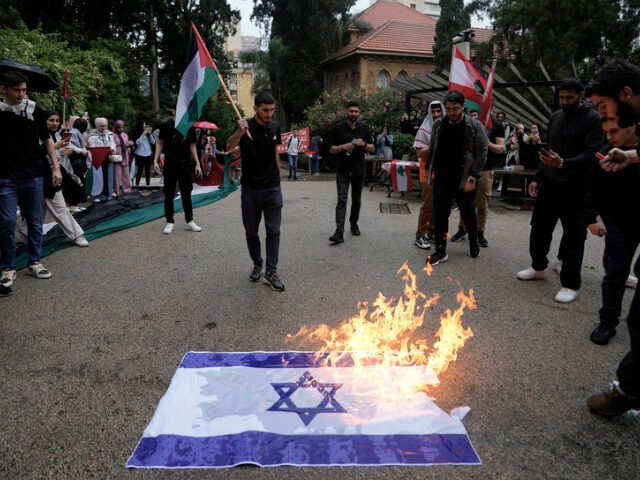Reports surfacing in Lebanese and Israeli media have documented what appears to be an online campaign in Lebanon against Pepsi, prompted by images of the soda company’s blue-and-white bottle caps, which detractors claim look too similar to the Israeli flag.
Pepsi has become the latest American brand to face a backlash in the Muslim-majority Middle East as part of the ongoing war between Hamas and Israel. While there is no indication that Pepsi has taken an aggressive stance as a corporation to support Israel’s self-defense efforts, its Western identity has long attracted suspicion, and it has been, in the past, falsely identified as an “Israeli” company. It joins other internationally recognized American brands — such as McDonald’s, Coca-Cola, KFC, and Starbucks — in attracting pro-Hamas ire.
Lebanon 24 reported on Friday that the online campaign, which featured angry patrons calling for a boycott and at least one video that appeared to show a group of young men dumping soda into the sea in protest, translated into multiple towns banning truck shipments of Pepsi products in opposition to Israel’s ongoing self-defense operation against the Sunni jihadist terrorist organization Hamas. At least four towns blocked Pepsi shipments, the outlet claimed, in “solidarity with the people of Palestine.”
“Pepsi changed the bottle caps to the Israeli flag. I have never seen anything more despicable. But the worst part is that we continue to buy their products,” the Israeli outlet Ynet quoted a social media boycotter saying.
L’Orient-Le Jour, a French-language Lebanese newspaper, reported on Friday that the controversy appears to have begun on Wednesday when an attorney, Ziad Jaafil, filed a legal action against Pepsi because he claimed the logo on Pepsi bottle caps was too similar to the Israeli flag. The logo on the bottle caps is white and blue, with the word “Pepsi” written in blue in the middle on a white background flanked by blue stripes. That logo does not appear on the side of the bottle, which instead shows the classic red, white, and blue Pepsi logo.
Jaafil reportedly “filed a notification with the Beirut Public Prosecution, requesting that the Lebanese Modern Company for Trade, the bottler of PepsiCo in Lebanon, stop the use of this logo due to its similarity in colors and layout to the Israeli flag.”
Images of the offending Pepsi bottle cap began going viral on social media, prominently the messaging application Whatsapp, and, soon, outlets were flooded with images appearing to show boycotters dumping Pepsi products or attempting to stop trucks bearing the Pepsi logo. In one video, which the Israeli public broadcaster KAN shared, a group of men dump what appear to be dozens of bottles of various sodas, all apparently Pepsi brands, onto a beach.
Other videos on social media show Pepsi products scattered and dumped in the streets, creating a public mess in a country with a notoriously dysfunctional sanitation system.
L’Orient-Le Jour reported that Pepsi redesigned its bottles in March 2023, and its decision did not seem to have any overt relationship to the ongoing conflict in the Hamas stronghold of Gaza. The current war began on October 7, 2023, when Hamas terrorists invaded Israeli residential communities and went on a mass murder, rape, and torture spree, killing an estimated 1,200 people and abducting another 250. The Israel Defense Forces (IDF) responded to the unprecedented attack with an ongoing operation meant to ensure that Hamas no longer has the capability to pose such a threat to its citizens.
Despite Hamas starting the war and, for years, upholding an explicitly genocidal ideology, many in the Arab world have opposed Israel’s measures, claiming that the Israeli operations are a campaign against Palestinian people trapped under Hamas rule rather than against Hamas itself. The IDF operation has prompted months of protests and riots in neighboring countries, including Lebanon.
The Lebanese Modern Company for Trade (SMLC), the company that distributes Pepsi in Lebanon, issued a statement on Friday categorically rejecting that it supports “the Israeli enemy,” claiming it has been targeted by “baseless accusations” and that it supports the country by employing Lebanese locals.
The Hamas-Israel conflict is of particular concern for Lebanon, as the Iran-backed Shiite terrorist group Hezbollah, in support of Israel, has been firing hundreds of rockets into the country since October. Hezbollah has outsized political power in poorly managed Lebanon, and its leader, Hassan Nasrallah, is widely believed to control many aspects of Lebanese political policy.
Nasrallah delivered a speech in June in which he threatened to attack Israel once again, claiming to have 100,000 terrorists at his disposal to wage war on Lebanon’s neighbor.
“The resistance’s manpower is unprecedented. We have recruited over 100,000 fighters,” Nasrallah claimed, according to the Iranian state propaganda outlet PressTV. “The enemy knows well that we have prepared ourselves for the worst… and that no place… will be spared our rockets.”
The IDF confirmed on Tuesday that it had approved “operations plans for an offensive in Lebanon” if necessary.

COMMENTS
Please let us know if you're having issues with commenting.